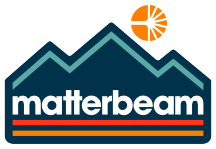Startup and Technology Projects
Matterbeam

Matterbeam is a data platform as a service that will finally let companies use their data.
The current way that data is integrated in organizations is suffering from conceptual inertia. Tools, patterns and techniques are used because "that's the way it's always been done" rather than how we actually want and need to use data in modern companies. Matterbeam breaks with some old ideas of how data should be moved and unlocks a new way for companies to think about, and engage with, their data.
Break free of data pipeline tyranny!
GameScape
During the pandemic, I had an opportunity to play table-top role playing games with friends online using remote tools. Being able to play online with my high school(!) gaming group was an unexpected silver lining. There are now a large collection of online role playing tools, but none of them worked exactly how I wanted them to work. I decided to build GameScape - a free, realtime, collaborative map and tokens tool. GameScape gave me an excuse to actually build something using some technologies I'd been interested in. These included: functional JavaScript, serverless, Dynamo based storage, log structured immutable storage, and real time web technologies like WebRTC and websockets.
Pybald
PyBald is a relatively straight-forward, no-frills, approach to building Python web applications. It's somewhat similar to flask (although it predates flask) and is based on some simple core ideas about composability in web components. Pybald is open source and released under the MIT license. Originally built as a learning exercise, Pybald has evolved into a robust framework of its own that was used to build the core of smarterer.com. If you're interested in learning more, contact support at tenzerolab.com.
TenZeroLab
Originally Tenzerolab was an attempt to accelerate Boston-area startups through a "pre-seed" accelerator - a way to bring potential co-founders together. Over time it has become a lab space for the startup consulting I've done as well as an umbrella over numerous side projects I've worked on over the years.
Previous Projects
Smarterer
Smarterer provided people a simple, fun, and authentic way to show what they know. Smarterer was a platform designed to score individuals on any and every digital, social, and technical skill under the sun. Using crowdsourced test design and a scoring mechanism similar to the one developed to rank chess masters, Smarterer rapidly determined your ability level and the ability level of your peers, colleagues and friends.
Smarterer was co-founded in October 2010 by Dave Balter @davebalter, myself @mikepk, and Jennifer Fremont-Smith @jfremontsmith.
In 2014, Utah-based Pluralsight aquired Smarterer and in 2015 merged Smarterer and the technology into the main Pluralsight product. Smarterer technology became the underpinning for Pluralsight's SkillIQ system.
SnapMyInfo
SnapMyInfo was a project exploring what could be done with QRcodes and contact sharing. The project also included elements of computer vision algorithms, some limited augmented reality, as well as a higher throughput contact sharing mechanism for conferences and networking events. The site shut down in 2018 after running for five years.
Emeraq
EMERAQ was a twitter robot designed just for fun. It even got a little bit of fame. A simple test of Twitter's API, it looked for people quoting from particular movies, then responded with relevant or linked quotes. The robot was shut down in 2012 after tweeting over 33,700 times (mostly to positive reactions).
Grazr
Grazr was a company built with the idea that "RSS is the defacto API to the web" (which was true, for a while). It worked to create the next generation of RSS tooling with a reader that was focused on sharing attention and "collections" of feeds in dynamic ways (using OPML as a container format). It had a dynamic "widget" that was found on many popular blogs and sites and a full scripting environment utilizing javascript in "the cloud" (before that was such a thing). It got a bit of buzz but never really found it's audience. Many of Grazr's Technologies were a bit ahead of their time. Grazr was never able to find success with the products we launched and officially shut down on September 30 of 2010.